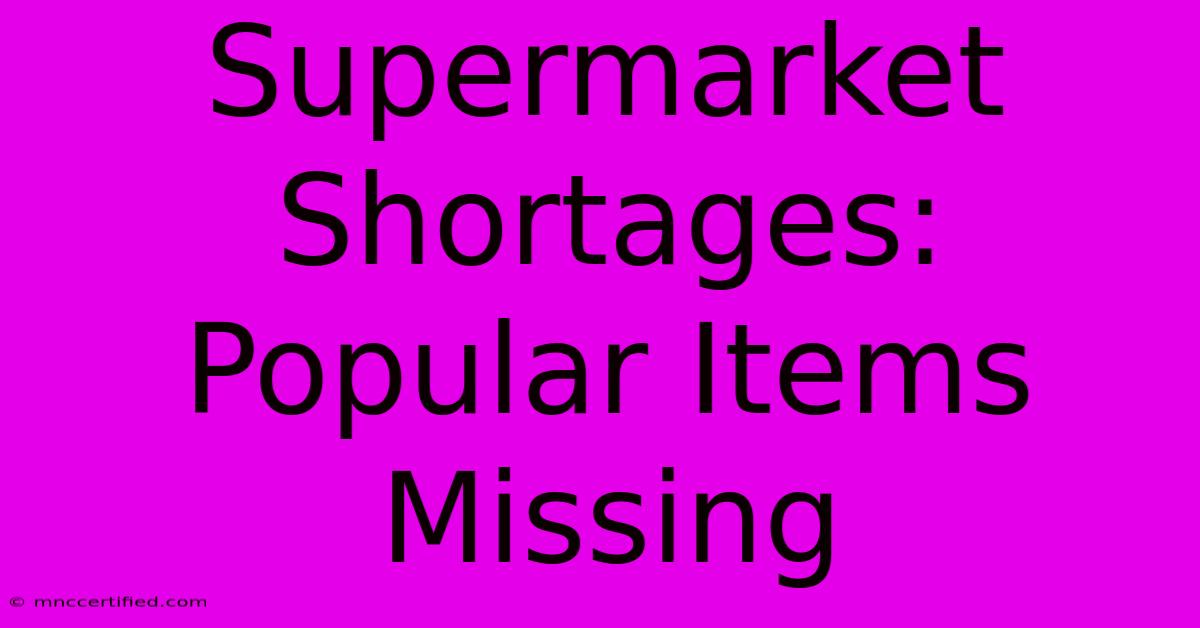Supermarket Shortages: Popular Items Missing

Table of Contents
Supermarket Shortages: Popular Items Missing From Shelves
Supermarket shelves are looking a little bare these days. Empty spaces where familiar products once sat are becoming increasingly common, leaving shoppers frustrated and wondering, "What's going on?" This article delves into the reasons behind these widespread supermarket shortages, focusing on the popular items most frequently affected. We'll explore the complex interplay of factors driving this trend and offer some insight into what the future might hold.
Why Are Supermarket Shelves Empty?
Several interconnected factors contribute to the current wave of supermarket shortages. It's not simply one issue, but a perfect storm of challenges impacting the entire supply chain.
1. Supply Chain Disruptions: The Lingering Effects of the Pandemic
The COVID-19 pandemic dramatically disrupted global supply chains. Factory closures, port congestion, and transportation bottlenecks created a ripple effect that continues to impact the availability of goods. This is particularly true for items reliant on complex global manufacturing and shipping processes.
2. Inflation and Rising Costs: Impact on Production and Distribution
Soaring inflation has significantly increased the cost of raw materials, energy, and transportation. Manufacturers are struggling to absorb these increased costs, leading to reduced production or increased prices. This can result in less product being available on store shelves.
3. Labor Shortages: A Critical Bottleneck
Across many sectors, including the food industry, labor shortages are a significant problem. From farm workers to truck drivers and retail employees, a lack of available workers impacts every stage of the supply chain, leading to delays and reduced availability of goods.
4. Geopolitical Instability: Global Events and Their Impact
Global events, such as the war in Ukraine, have significant consequences for the global food supply. Ukraine is a major exporter of grains and other agricultural products, and the conflict has disrupted these crucial supply lines, contributing to shortages of certain food items worldwide.
5. Consumer Demand: Unexpected Shifts and Trends
Changing consumer behavior also plays a role. Unpredictable shifts in demand for certain products can strain supply chains, leading to temporary shortages. This is especially true for items that suddenly gain popularity due to trends or seasonal changes.
Which Popular Items Are Affected?
The shortages aren't limited to a few niche products; many everyday items are affected. Here are some of the popular items frequently reported as missing from supermarket shelves:
- Cooking Oils: Sunflower oil, in particular, has been significantly impacted due to the war in Ukraine.
- Certain Grains: Wheat and other grains are affected by global supply chain disruptions and geopolitical instability.
- Processed Foods: Many processed foods rely on a complex network of ingredients and manufacturing processes, making them vulnerable to supply chain disruptions.
- Baby Formula: This is a particularly sensitive area, with shortages creating significant hardship for families.
- Fresh Produce: Weather events and transportation issues can severely impact the availability of fresh fruits and vegetables.
- Meat and Poultry: Rising feed costs and labor shortages contribute to shortages in this category.
What Can We Expect in the Future?
Predicting the future of supermarket shortages is challenging, but experts suggest the issue is likely to persist for some time. Addressing the underlying problems—strengthening global supply chains, mitigating inflation, and tackling labor shortages—will require sustained effort and collaboration across governments, businesses, and consumers.
What Can Consumers Do?
While the situation is largely outside of individual consumer control, being aware of potential shortages and adapting your shopping habits can help ease the impact:
- Plan your meals ahead: This helps you buy only what you need and reduces food waste.
- Be flexible with your choices: If your preferred brand is unavailable, try a substitute.
- Consider buying in bulk (when appropriate): This can help you stock up on staples when they are available.
- Support local farmers markets: Buying locally sourced produce can help reduce reliance on long-distance supply chains.
Supermarket shortages are a complex issue with far-reaching consequences. Understanding the contributing factors and adapting our shopping habits can help us navigate these challenges and ensure everyone has access to the food they need. The situation is dynamic, so staying informed and being adaptable will be key in the coming months.

Thank you for visiting our website wich cover about Supermarket Shortages: Popular Items Missing. We hope the information provided has been useful to you. Feel free to contact us if you have any questions or need further assistance. See you next time and dont miss to bookmark.
Featured Posts
-
Lainey Wilson Country Girl Spin
Nov 27, 2024
-
Rv Insurance In North Carolina
Nov 27, 2024
-
Homeserve Water Line Insurance
Nov 27, 2024
-
Coles Opens Up On Grief
Nov 27, 2024
-
Walmarts Dei Update Furners Assurance
Nov 27, 2024